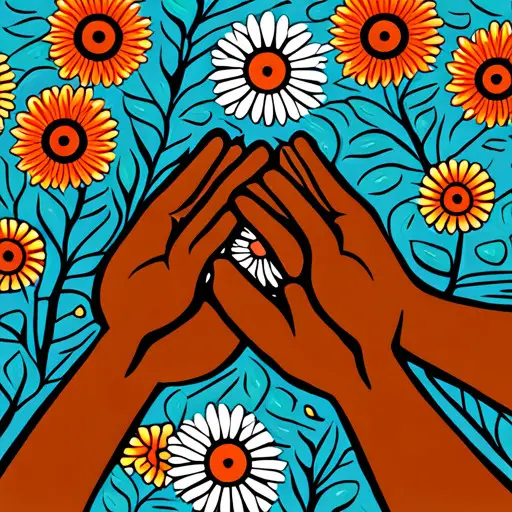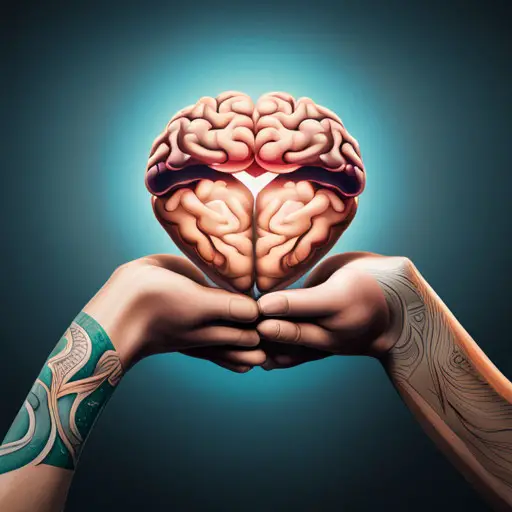You may be thinking, “Emotional connection? That sounds a bit too touchy-feely for me.” But before you dismiss the idea, consider this: emotional connection is crucial to our well-being and happiness. It’s what makes us feel seen, heard, and understood by those around us.
When we have emotional connections with others, we feel more fulfilled in our relationships and are better equipped to handle life’s challenges. But what exactly is an emotional connection? And how can we cultivate it in our lives? In this article, we’ll explore these questions and provide practical tips for building stronger emotional connections with the people in your life.
Key Takeaways
– Emotional connection is crucial for well-being and happiness, and involves vulnerability, trust, and openness.
– Conflict and misunderstandings are inevitable, but addressing them through open communication and active listening can strengthen emotional connection.
– Emotional distance can occur, and it’s important to acknowledge and address it by identifying potential causes and taking action together.
– Emotional connection is essential in all types of relationships, including personal and professional ones, and nurturing it is important for overall well-being.
Understanding the Definition of Emotional Connection

You can’t fully grasp the concept of emotional connection without understanding how it feels to have your heartstrings tugged. Emotional connection is a bond or attachment that forms between two people when they share deep emotions, thoughts, and experiences. It’s the feeling you get when you’re in sync with someone, and you understand each other on a level that goes beyond words.
An emotional connection requires vulnerability, trust, and openness. It’s not just about sharing good times but also being there for each other during tough times. When you feel emotionally connected to someone, you know that they have your back no matter what. You feel safe to express yourself without fear of judgment or rejection.
Recognizing the signs of emotional disconnection is important if you want to maintain healthy relationships in your life. When someone is emotionally disconnected from you, they may seem distant or uninterested in what’s going on in your life. They might not respond to your calls or texts as quickly as they used to, and their body language might show signs of disinterest when you’re together. It’s essential to address these issues early on so that you can work towards reconnecting emotionally with those who matter most to you.
Recognizing the Signs of Emotional Disconnection

Feeling like you’re shouting into a void instead of having a meaningful conversation can be like trying to light a match in a hurricane. It’s frustrating, disheartening, and ultimately leaves you feeling disconnected from the person you’re talking to. But how do you know when this is happening? Here are three signs that may indicate emotional disconnection:
1. Lack of eye contact: When someone is emotionally disconnected, they may avoid making eye contact with you during conversations. This can make it feel like they aren’t really present or engaged in the conversation.
2. One-sided conversations: If one person is doing all the talking while the other seems uninterested or distracted, it’s likely that there is an emotional disconnect between them.
3. Frequent misunderstandings: Misunderstandings happen in every relationship, but if they happen frequently and lead to disagreements or hurt feelings, it could be a sign that there is an emotional disconnect between you and the other person.
Recognizing these signs can be difficult, especially if you care deeply about the person you’re talking to. However, by acknowledging these red flags, you can begin taking steps towards cultivating emotional connection with them.
As we move into discussing strategies for cultivating emotional connection, remember that recognizing when there’s an issue is just as important as finding ways to solve it. By paying attention to these signs of emotional disconnection and addressing them head-on, we open up opportunities for deeper understanding and meaningful communication with those we care about most.
Strategies for Cultivating Emotional Connection

Start by actively listening to the person you’re trying to connect with, and show them that you value their thoughts and opinions. This means putting aside distractions such as phones or other devices, maintaining eye contact, and asking follow-up questions. By truly engaging in conversation with someone, you show them that they are important to you and that their feelings matter.
Another strategy for cultivating emotional connection is through shared experiences. Whether it’s trying a new activity together or simply watching a movie, doing things together can deepen your bond. In addition, making memories together can create a positive association between you and the other person, increasing feelings of attachment.
Finally, make sure to express appreciation and gratitude towards the other person on a regular basis. Acknowledge what they do well or what you admire about them. Not only does this show that you recognize their strengths and qualities, but it also reinforces positive emotions within your relationship.
| Strategies for Cultivating Emotional Connection | Examples |
|---|---|
| Active Listening | Maintaining eye contact; asking follow-up questions |
| Shared Experiences | Trying a new activity together; watching a movie |
| Expressing Appreciation | Acknowledging strengths; expressing gratitude |
Navigating challenges in maintaining emotional connection can be difficult at times. However, these strategies provide a strong foundation upon which to build lasting connections with others. By remaining present during conversations, sharing experiences together, and expressing appreciation regularly, you can foster deep emotional bonds with those around you.
Navigating Challenges in Maintaining Emotional Connection

When it comes to maintaining emotional connection in your relationship, it’s important to be aware of the challenges that can arise. Conflict and misunderstandings are inevitable, but knowing how to navigate them can strengthen your bond. Additionally, addressing emotional distance head-on is crucial for keeping the connection alive and well.
Dealing with Conflict and Misunderstandings
Addressing conflicts and misunderstandings can be challenging, but it’s important to communicate openly and find a resolution. One way to do this is by using the “I” statement technique. This involves stating how you feel about a situation without blaming or attacking the other person. For example, instead of saying “You always make me feel like I’m not important,” you could say “I feel hurt when I don’t receive your attention.” This approach allows both parties to express their emotions without becoming defensive.
Another helpful tool is active listening. This means paying full attention to what the other person is saying and reflecting back on what they said before responding. It’s also important to ask clarifying questions if something is unclear. By practicing active listening, both parties can better understand each other’s perspective and work towards finding a solution that works for everyone. Remember, conflict and misunderstandings are natural in any relationship, but by communicating openly and actively listening, you can strengthen your emotional connection with your partner.
Transition: While addressing conflicts and misunderstandings is crucial in maintaining an emotional connection with your partner, sometimes distance can still occur in relationships despite best efforts.
Addressing Emotional Distance in Relationships
Sometimes, relationships can feel like ships passing in the night, struggling to stay afloat amidst choppy waters and changing tides. You may find yourself wondering where the emotional connection between you and your partner has gone. It’s not uncommon for couples to experience emotional distance at some point in their relationship. However, it’s important to address this issue before it turns into a bigger problem.
To start addressing emotional distance in your relationship, consider these three things:
– Acknowledge the issue: The first step towards resolving any problem is acknowledging that it exists. Talk openly with your partner about how you’re feeling and what you’ve observed.
– Identify potential causes: Emotional distance can have many different causes, including stress from work or other life events, changes in routine, or simply growing apart over time. Identifying potential causes can help you both understand why the distance exists.
– Take action together: Once you’ve acknowledged the issue and identified potential causes, take action together to address it. This could mean dedicating more time to spending quality time together or seeking outside help from a therapist.
By taking steps towards addressing emotional distance in your relationship, you’ll be able to rebuild the emotional connection that brought you together in the first place. Remember that emotional connection is vital not only in our romantic relationships but also in different areas of our lives such as family relationships, friendships and even professional connections.
The Importance of Emotional Connection in Different Areas of Our Lives

When it comes to your relationships, emotional connection is essential. It’s what makes the difference between a superficial connection and a deeper bond. Whether you’re talking about romantic relationships, friendships, or family bonds, having an emotional connection can help you navigate challenges and build stronger connections with those around you. Additionally, emotional connections are also important in professional settings and community involvement, as they allow us to better understand and communicate with others.
Romantic Relationships
If you’re in a romantic relationship, it’s important to cultivate an emotional connection with your partner. This means going beyond the physical attraction and building a deeper level of intimacy that can sustain your relationship through good times and bad. Here are some ways you can strengthen your emotional bond:
– Communicate openly and honestly: Share your thoughts, feelings, and fears with each other without fear of judgment or rejection.
– Show empathy and compassion: Take the time to understand each other’s perspective and offer support when needed.
– Make time for shared experiences: Whether it’s trying new things together or simply spending quality time together, creating positive memories can help deepen your emotional connection.
As important as it is to have a strong emotional connection in romantic relationships, the same holds true for friendships and family bonds. By nurturing these connections, you can create a sense of belonging that enriches all aspects of your life.
Friendships and Family Bonds
Now that we’ve explored the emotional connection in romantic relationships, let’s talk about the importance of maintaining close friendships and family bonds. These connections are just as vital to our emotional well-being and can provide us with a sense of comfort, support, and belonging.
Having strong relationships with friends and family members can give you a safe space to be yourself without fear of judgment or rejection. They can also help you navigate through life’s challenges by providing you with different perspectives, advice, and encouragement. Furthermore, spending quality time with loved ones has been shown to reduce stress levels and improve overall happiness. So don’t take these relationships for granted – make sure to invest your time and effort into nurturing them.
As you continue to cultivate these meaningful connections in your personal life, it’s also important to consider building professional connections and getting involved in your community. By expanding your network beyond your immediate circle, you’ll have more opportunities for personal growth, career advancement, and making a positive impact on the world around you. Let’s explore this idea further in the next section.
Professional Connections and Community Involvement
Expanding your professional network and involvement in your community can lead to personal growth, career advancement, and making a positive impact on the world around you. Not only can networking help you land new job opportunities or meet like-minded individuals who share similar interests, but it can also provide you with valuable insights into different industries and career paths. Building strong relationships with professionals in your field can open doors to mentorship opportunities, collaborations, and even potential business partnerships.
In addition to professional connections, getting involved in your local community can also have a significant impact on both yourself and those around you. Whether it’s volunteering at a local shelter or participating in neighborhood clean-up events, community involvement allows you to give back to society while also gaining a sense of fulfillment from helping others. By working together towards a common goal, you’ll not only strengthen existing relationships but also create new ones with people who share similar values and passions as yourself.
| Benefits of Professional Networks | Benefits of Community Involvement |
|---|---|
| Increased job opportunities | Opportunities for personal growth |
| Mentorship and collaboration opportunities | Sense of fulfillment from helping others |
| Access to industry insights and knowledge | Building stronger relationships within the community |
| Potential for business partnerships | introduction to new experiences that may change perspectives on life. |
Conclusion
So, there you have it! You now have a better understanding of emotional connection and how vital it is to our overall well-being. By recognizing the signs of emotional disconnection and implementing strategies for cultivating emotional connection, we can improve our relationships with others and ourselves.
Remember that maintaining emotional connection requires effort and patience, but the rewards are immeasurable. As the famous saying goes, “No man is an island.” We all need human connections to thrive in this world. So, take the time to nurture your relationships with loved ones, colleagues, and even strangers. Who knows? Perhaps by doing so, you might just change someone’s life for the better.

